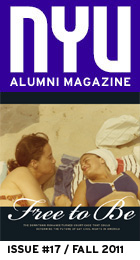
“Whether it’s about hygiene, or understanding why frying an egg works the way it does, or roasting a chicken…cooking is science.”
—Chef Maxime Bilet, co-author of Modernist Cuisine: The Art and Science of Cooking, at the NYU Experimental Cuisine Collective’s fourth-anniversary symposium“The more you remember your life, your childhood, your most shameful moments, the more you become creative because you get rid of the fear of shame.”
—Egyptian physician, psychiatrist, author, and activist Nawal El Saadawi delivering a public lecture on “Creativity, Dissidence, and Women” at the Kimmel Center for university life“I started off as a lecturer in a university when I was somewhat younger. Universities, as you know, stand for objectivity, rationality, impartiality—for the disinterested pursuit of truth. And these are all qualities you have to leave behind when you go into politics.”
—Former U.K. Prime Minister and NYU distinguished Global Leader in Residence Gordon Brown at the Robert F. Wagner Graduate School of Public Service“It would be no exaggeration to say that the Eichmann trial was instrumental in turning the Final Solution into the Holocaust, and by that I simply mean that it took a terrifying episode of state-sponsored atrocity—an episode which up until that moment had largely been treated and comprehended as one chapter in the overall horror of the Second World War—and liberated it from the logic of armed conflict to say that this event is perhaps the emblematic event of the 20th century.”
—legal scholar Lawrence Douglas of Amherst College at “The 50th Anniversary of the Eichmann Trial—A Look Back,” a symposium hosted by the Taub Center for Israel Studies






